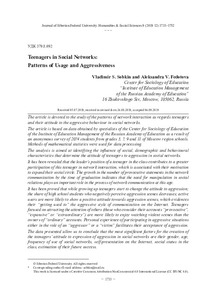Teenagers in Social Networks: Patterns of Usage and Aggressiveness
Скачать файл:
URI (для ссылок/цитирований):
https://elib.sfu-kras.ru/handle/2311/125585Автор:
Sobkin, Vladimir S.
Fedotova, Aleksandra V.
Собкин, В. С.
Федотова, А. В.
Дата:
2019-09Журнал:
Журнал Сибирского федерального университета. Гуманитарные науки. Journal of Siberian Federal University. Humanities & Social Sciences;2019 12 (9)Аннотация:
The article is devoted to the study of the patterns of network interaction as regards teenagers and their attitude to the aggressive behaviour in social networks.
The article is based on data obtained by specialists of the Center for Sociology of Education of the Institute of Education Management of the Russian Academy of Education as a result of an anonymous survey of 2074 students from grades 5, 7, 9 and 11 of Moscow region schools. Methods of mathematical statistics were used for data processing.
The analysis is aimed at identifying the influence of social, demographic and behavioural characteristics that determine the attitude of teenagers to aggression in social networks.
It has been revealed that the leader’s position of a teenager in the class contributes to a greater participation of this teenager in network interaction, which is associated with their motivation to expand their social circle. The growth in the number of provocative statements in the network communication by the time of graduation indicates that the need for manipulation in social relations plays an important role in the process of network communication at this age.
It has been proved that while growing up teenagers start to change the attitude to aggression; the share of high school students who negatively perceive aggression scenes decreases; active users are more likely to show a positive attitude towards aggression scenes, which evidences their “getting used to” the aggressive style of communication on the Internet. Teenagers focused on attracting the attention of others (those who consider their accounts “provocative”, “expansive” or “extraordinary”) are more likely to enjoy watching violent scenes than the owners of “ordinary” accounts. Personal experience of participating in aggressive situations either in the role of an “aggressor” or a “victim” facilitates their acceptance of aggression.
The data presented allow us to conclude that the most significant factors for the creation of the teenagers’ attitude to expression of aggression in social networks are their gender, age, frequency of use of social networks, self-presentation on the Internet, social status in the class, estimation of their future success Статья посвящена изучению особенностей сетевого взаимодействия подростков и их отношения к проявлениям агрессии в социальных сетях.
В основу статьи легли данные, полученные сотрудниками Центра социологии образования
«Института управления образованием Российской академии образования» в ходе анонимного анкетного опроса 2074 учащихся 5, 7, 9 и 11 классов школ московской области.
При обработке данных использовали методы математической статистики.
Анализ результатов направлен на выявление влияния социально-демографических
и поведенческих характеристик, определяющих отношение подростков к агрессии в социальных сетях.
Выявлено, что лидерская позиция в коллективе класса в большей степени ориентирует подростка на сетевое взаимодействие, связанное с мотивацией расширения его социальной
среды. Рост провокативных установок при общении в сети на этапе окончания школы свидетельствует о том, что в процессе сетевого общения на этом возрастном этапе важную роль играет потребность в манипуляции в сфере социальных отношений.
Показано, что с возрастом уменьшается доля подростков, негативно воспринимающих
сцены агрессии; активные пользователи чаще проявляют позитивное отношение
к таким сценам, что свидетельствует о «привыкании» к агрессивной стилистике общения в Интернете. Подростки, ориентированные на привлечение внимания окружающих
(те, кто считает свои профили «провокационными», «откровенными» или «неординарными»), чаще получают удовольствие от просмотра сцен насилия, чем владельцы
«обычных» страниц. Наличие у подростков опыта участия в ситуациях агрессии
в роли «агрессора» или «жертвы» способствует принятию ими агрессии.
Приведенные данные позволяют сделать вывод о ведущей роли в формировании отношения
подростков к проявлениям агрессии в социальных сетях таких факторов, как пол, возраст, интенсивность пользования социальными сетями, самопрезентация в сети, социальный статус в классе, оценка своей будущей успешности
Коллекции:
Метаданные:
Показать полную информациюСвязанные материалы
Показаны похожие ресурсы по названию, автору или тематике.
-
Социальные медиа как форма бытия и социальный институт
Шалимов, А.Б.; Shalimov, Andrey B. (Сибирский федеральный университет. Siberian Federal University., 2012-07)The multiuser sites, which are constructed on web 2.0 technology and forming a special type of social networks, unite a huge part of mankind at present. Social networks are understood as alternative form of being, namely ... -
Change of Fundamental Metaphors of Worldviews in Sociology
Otreshko, Natalia B.; Отрешко, Н.Б. (Сибирский федеральный университет. Siberian Federal University., 2013-08)The article studies main metaphors which contained in scientific patterns of the world of modern sociology. The author maintains that there is the change of main metaphors in the modern sociological theory from the metaphor ... -
Typology of Approaches to Studing Social Capital
Negrei, Natal’ya V.; Негрей, Н.В. (Сибирский федеральный университет. Siberian Federal University., 2014-01)The article summarizes and explains the most popular approaches to the study of social capital. It presents a new definition of social capital and establishes the correlation of between social capital with human, cultural, ... -
Перспектива институциональной трансформации российской высшей школы
Kislov, Alexandr G.; Кислов, А.Г.; Shmurygina, Ol’ga V.; Шмурыгина, О.В. (Сибирский федеральный университет. Siberian Federal University., 2013-03)The article is devoted to the identification (and self-identification) crisis that has been suffered lately in the sphere of higher education, and the prospects for overcoming it. In comparison with some developed countries, ... -
Социальные аспекты университетской электронной библиотеки: новая инициатива Сибирского федерального университета
Смолянинова, О.Г.; Smolyaninova, Olga G.; Рыжкова, Т.Н.; Ryzhkova, Tatyana N. (Сибирский федеральный университет. Siberian Federal University., 2010-10)The article introduces the project of Siberian Federal University which explores the potential of the university digital library as a strategy for human resource development. The latter is planned to be achieved by ...

